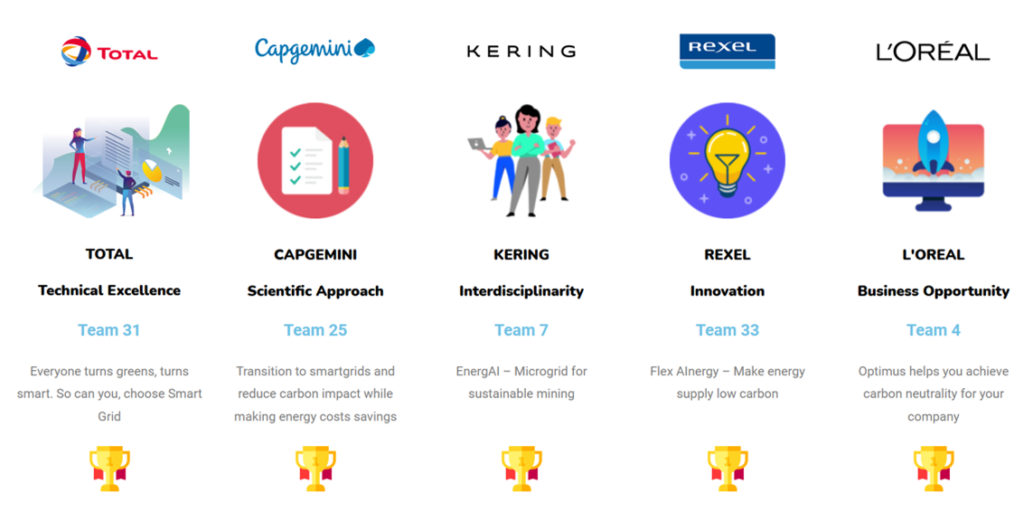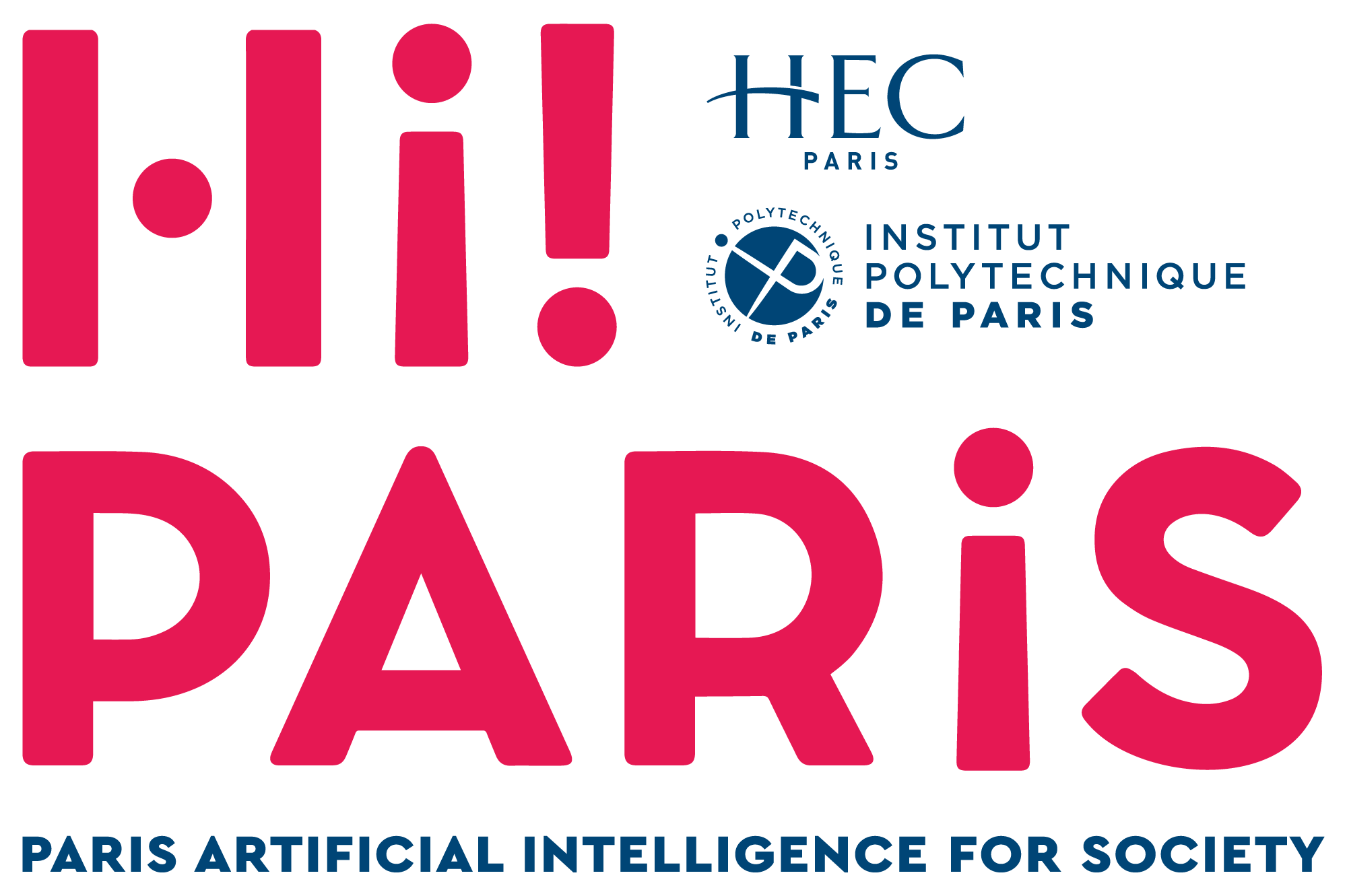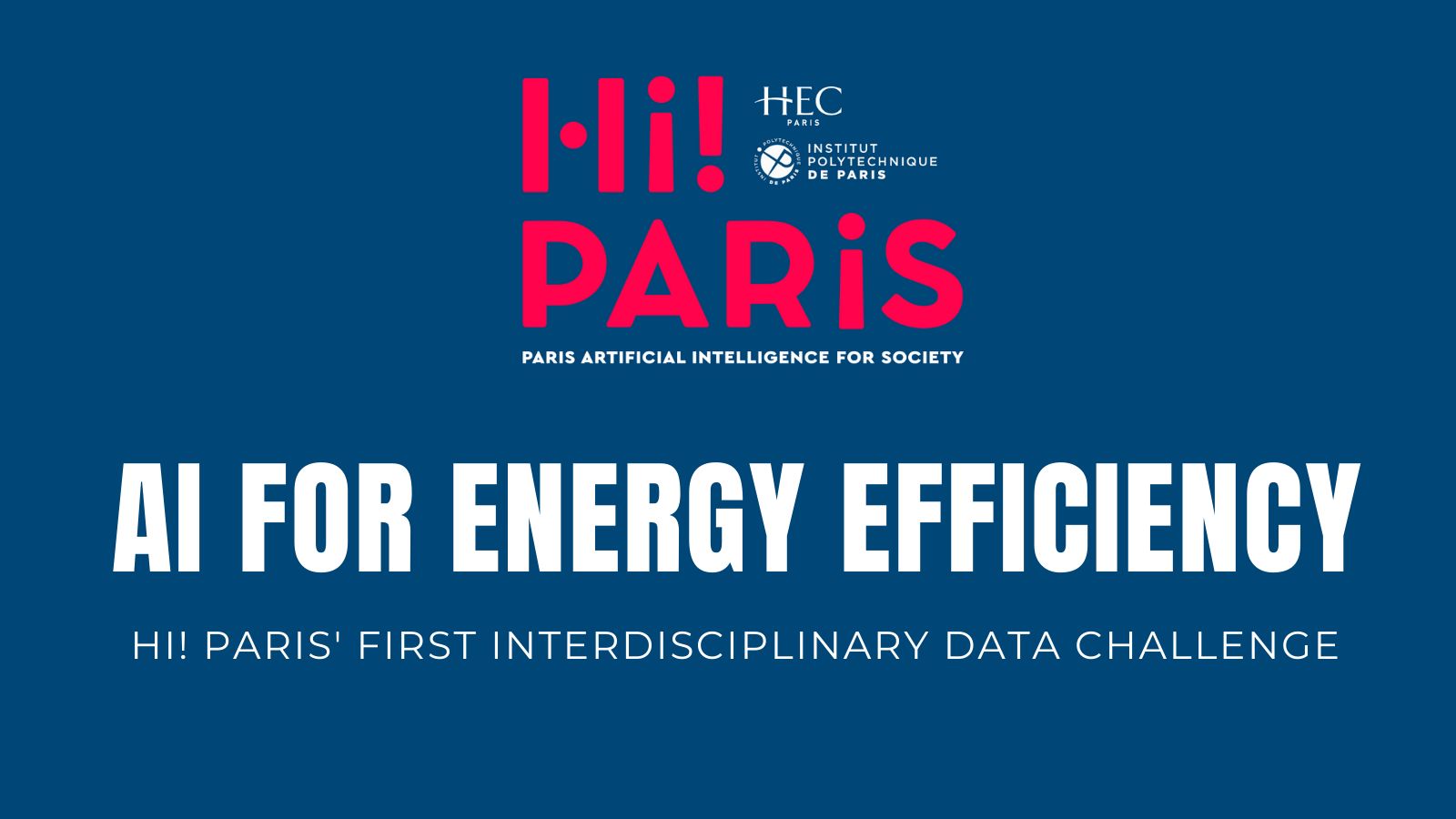First Hi!ckathon – Results
Students of Institut Polytechnique de Paris and HEC Paris brainstorm AI and Data Science solutions to address global challenges for energy efficiency.
 The Hi! PARIS Center organized Hi!ckathon, the first-ever AI and data science challenge on the topic of “AI for Energy Efficiency”. 187 students from HEC Paris and the five schools of Institut Polytechnique de Paris (Ecole Polytechnique, ENSTA Paris, ENSAE Paris, Telecom Paris and Telecom Sud Paris) formed 35 interdisciplinary teams to compete for the awards sponsored by the Center’s founding corporate donors L’Oréal, Capgemini, Total, Kering and Rexel.
The Hi! PARIS Center organized Hi!ckathon, the first-ever AI and data science challenge on the topic of “AI for Energy Efficiency”. 187 students from HEC Paris and the five schools of Institut Polytechnique de Paris (Ecole Polytechnique, ENSTA Paris, ENSAE Paris, Telecom Paris and Telecom Sud Paris) formed 35 interdisciplinary teams to compete for the awards sponsored by the Center’s founding corporate donors L’Oréal, Capgemini, Total, Kering and Rexel.
On March 12, the Hi! PARIS Center Hi!ckathon brought together students from diverse schools, programs and disciplines for a 48-hour data challenge, collaboration and reflection, with a single objective: to discover the solution that best optimizes energy consumption while reducing carbon emissions and cost. This objective, fueled by artificial intelligence, machine learning and data science applications, is a critical step forward towards a more innovative, energy-efficient approach in the fight against global climate change.
“Think out of the box, the sky is the limit! Innovation relies on diversity,” said Eric Labaye, President of both Institut Polytechnique de Paris and Ecole Polytechnique, during the opening ceremony. Indeed, the participating students from six schools combined a variety of programs in the fields of business, entrepreneurship, engineering and data science, making this hackathon a hotbed of creative ideas as they work to find holistic solutions.
“The major challenges that we face have to be tackled in a pluridisciplinary way,” said Eloïc Peyrache, Dean of HEC Paris. “More than ever, students and future graduates must play the card of complementarity and build the capacity to interact and co-construct solutions with people of different educational backgrounds.”
The hackathon’s central theme – “AI for Energy Efficiency” – was narrowed down to a specific goal where students were required to optimize the energy costs of three buildings while remaining as frugal as possible in their proposed solutions. The winning projects would be from teams who had crossed the finish line within the time limit and who had successfully convinced the jury with the three mandatory deliverables: a data science model, a scientific approach and a business pitch. The students were competing for five themed prizes sponsored by Hi! PARIS Center’s founding corporate donors L’Oréal, Capgemini, Total, Kering
“I want to congratulate all the students for embracing such a difficult topic and for delivering a complete working solution with the help of coaching sessions and webinars by data scientists from the Center’s corporate donors,” said Gaël Richard, Executive Director of Hi! PARIS Center during the Hi!ckathon closing ceremony. He also reiterated the impact of AI and Data Science in addressing incredible challenges like climate change and sustainability, as part of the core ambitions of the Hi! PARIS Center.
“What stands out from this hackathon is the strength of diversity. By combining different perspectives, the teams were able to bring different solutions and the table,” commented Thierry Foucault, HEC Paris professor and Scientific Co-Director of Hi! PARIS Center.
Eric Moulines, Professor at Ecole Polytechnique (IP Paris) and Scientific Co-Director of Hi! PARIS Center, added that he was proud of the outcome of this first hackathon organized by the Center. “Students have shown their ability to go well beyond what they have learnt at schools.”
Members of the jury comprised of academics and data science experts were equally impressed. 19 projects were presented during the final, five of which were awarded by the Hi! PARIS Center’s corporate donors:
Technical Excellence Award by Total
The Technical Excellence Award by Total rewards the team whose data science model has achieved the highest score, calculated based on a synthetic measure of the model’s accuracy and environmental performance. The winning team of students from Ecole Polytechnique and HEC Paris used the rule-based approach – one of the four possible scientific approaches used in this challenge – to prove that Smart Grid solutions are effective in optimizing energy consumption in the most cost-efficient way while also having positive social and environmental impact.“Frugality was a key criteria in this data challenge. If we are to build solutions for the energy transition, we must be aware of the impact of the final product but also how we get to this solution. With that perspective in mind, Team 31 (Smart Grid) really understood the importance of having efficient algorithms,” said Gonzague Henri, Senior Researcher Scientist at Total.
Team 31 – Smart Grid
Alexandre Misrahi (Ecole Polytechnique)Cyrus Pellet (Ecole Polytechnique)
Fabien Roger (Ecole Polytechnique)
Malo Lahogue (Ecole Polytechnique)
Romain Besombes (HEC Paris)
Willie Hernandez (HEC Paris)
Through this award, the team will have the opportunity to be part of a learning expedition to Stanford, discover its innovation ecosystem and exchange with its researchers.
Interdisciplinarity Award by Kering
The Interdisciplinarity Award by Kering is given to the team that was most able to leverage several disciplines in the production of a scientific approach and a convincing business opportunity pitch. The winning team banked on their diverse expertise in communication, business, engineering and entrepreneurial backgrounds, to develop software solutions that optimize and secure microgrids functioning for the diamond-mining sector. A highly carbon-intensive industry, the team showed that diamond-mining can become sustainable through the use of renewable energy.“This prize embodies the fact that, to successfully implement artificial intelligence in a process, it would require a combination of multiple collaborative standpoints. Team 7 (EnergAI) really put human at the center of their approach and offered a good compromise between efficiency, performance and interdisciplinarity,” said Nicolas Polaillon, Chief Data Officer at Kering.
Team 7 – EnergAI
Anne-Sophie Dielen (MSc X-HEC Entrepreneurs)Hugo Weidmann (MSc X-HEC Entrepreneurs)
Victor Bossard (MSc X-HEC Entrepreneurs / SUPAERO Engineer)
Aubry d’Andoque de Sériège (MSc X-HEC Entrepreneurs / SUPAERO Engineer)
Jean de Bodinat (MSc X-HEC Entrepreneurs / Edinburgh University Cognitive Scientist)
The Interdisciplinarity Award includes a condensed learning day at Kering that includes a visit to the AI research lab and discovering the key initiatives and sustainability strategy of the company.
Scientific Approach Award by Capgemini
The Scientific Approach Award by Capgemini rewards the team that best demonstrates the ability to justify its scientific approach and confront the state-of-the-art in Data Science. The winning team showcased a solar-based solution that synchronizes energy demands with needs by producing the right amount of energy from the correct source. Using a machine learning approach, Team 25’s solution includes an automated detection of companies’ energy requirements, while reducing cost and maximizing carbon-free opportunities.“I’m impressed by the depth of the science that has been used during this data challenge. This prize is about how to combine science, business and data science to solve a real-world problem. Team 25 combined a lot of exciting approaches together. We particularly appreciated how deeply they explored the data to understand how microgrids works,” said Moez Draief, Chief Data Scientist at Capgemini Invent.
Team 25
Guillaume Paya-Monet (Telecom Paris)Elsa Bismuth (Ecole Polytechnique)
Hossein Moghaddam (Telecom Sud Paris)
Quentin Ciccarone (HEC Paris)
Valentine Malivel (HEC Paris)
This award enables the team of students to visit Capgemini’s Innovation Center and participate in a unique coaching session in innovation, offered by renowned Data Scientists and Data Consultants.
Business Pitch Award by L’Oréal
The Business Pitch Award by L’Oréal is presented to the team that best projected itself in the market context through an impactful video speech. Optimus, the winning team, impressed the jury with a very concrete and visual presentation of how its solution helps businesses achieve carbon neutrality through better energy consumption and greater use of clean energy. Using advanced machine learning and real-time decision tools, Optimus enables companies to monitor their carbon emission through data visualization, while simultaneously reducing both energy and carbon costs.“Being a CDO, I’m interested in how technology can impact business. I was impressed by Team 4 (Optimus) and the sustainability dimension of their project because I’m striving to explore how tech can help on sustainability matters and how tech can be sustainable in itself. This team decided to tackle a very important subject, which is carbon neutrality. They delivered a very structured pitch with clear business objectives, markets segments and consumer targets,” said Stéphane Lannuzel, Operations Chief Digital Officer at L’Oreal.
Team 4 – Optimus
Maayane Attias (Ecole Polytechnique)Noah Sarfati (Ecole Polytechnique)
Simo Alami (PhD student, IP Paris)
Lea Attia (ENSAE Paris)
Claire Trescartes (HEC Paris)
Holly Quintard (HEC Paris)
Léa Amar (MINES ParisTech)
The award winners will spend a condensed “Innovation & Learning Day”, which includes a visit to an AI research lab, an exchange with L’Oréal experts and a training for interviews.
Innovation Award by Rexel
The Innovation Award by Rexel rewards the team that produced an original, unexpected yet relevant solution to the challenge presented during the hackathon. The award winners from Team Flex AInergy were selected for their proposition of a microgrid solution that optimizes the integration of economical, risk and environmental axes all at the same time. The Flex AInergy solution is designed to make energy supply low-carbon by allowing clients to simulate different balances and forecast their energy build, dependence on the public grid, and their energy carbon footprint.“It is great to see how much energy and dedication Team 33 (Flex AInergy) put in tackling such an important issue of our time. We saw some very innovative scientific approaches during this hackathon as well as truly new business opportunities. We were really impressed by how new this team’s approach was and all the different techniques that they used. We really hope that some of these ideas come to light in the future,” said Constance Grisoni, Data Solutions Manager at Rexel.
Team 33 – Flex AInergy
Guillaume de Surville (HEC Paris)Grégoire Bussières (ENSTA-HEC Paris)
Valentin Bernu (Télécom Paris – ENSTA Paris)
Pierre-Antoine Arsaguet (Télécom Sud Paris)
Théotime Lecorbeiller (HEC Paris)
The winning team will have the opportunity to visit Rexel’s connected building innovation center, or the Rexel Foundation. They will also be encouraged to pursue their hackathon project with the assistance of experts from Rexel.


